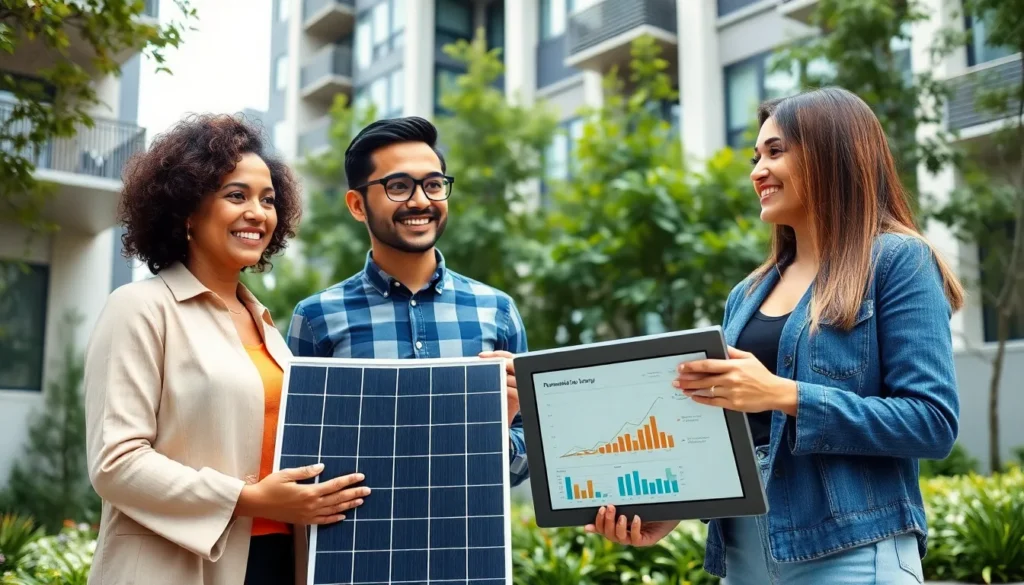Table of Contents
ToggleIn a world where gadgets reign supreme and the planet’s health hangs in the balance, sustainable tech solutions are stepping up like superheroes in spandex. These innovations not only promise to save the day but also keep the Earth from turning into a giant dust bunny. Imagine a future where your smartphone doesn’t just connect you to friends but also helps the polar bears find their icebergs. Sounds dreamy, right?
Overview of Sustainable Tech Solutions
Sustainable tech solutions emerge as pivotal in tackling environmental challenges. Numerous advancements leverage renewable energy sources, reducing carbon footprints. Electric vehicles represent one significant innovation, offering cleaner alternatives to traditional combustion engines.
Smart home devices enhance energy efficiency. Smart thermostats adjust temperatures based on occupancy, optimizing energy use. Solar panels continue to gain popularity, converting sunlight into electricity, and minimizing reliance on fossil fuels.
Innovations in material science provide biodegradable alternatives to conventional plastics. Companies develop plant-based materials that degrade naturally, significantly reducing waste accumulation. Innovations span various sectors, including agriculture, where precision farming technologies improve resource management.
Green data centers adopt advanced cooling techniques. These practices lead to substantial reductions in water and electricity usage. Cloud computing enables efficient resource sharing, further decreasing energy consumption.
Technologies targeting waste management enhance recycling processes. Automated systems identify and sort recyclable materials, streamlining operations within waste facilities. Mobile apps connect users to local recycling programs, fostering community engagement in sustainability efforts.
Sustainable tech solutions represent a growing market. By 2025, the global green technology and sustainability market is projected to reach $36.6 billion, according to a report by Research and Markets. Innovations not only support environmental health but also drive economic growth.
Investment in sustainable technologies fosters a greener future. As these solutions evolve, they present practical means to address climate change impacts while improving quality of life. Organizations and individuals increasingly recognize the importance of implementing sustainable practices within their daily operations.
Benefits of Sustainable Tech Solutions

Sustainable tech solutions offer numerous advantages, positively influencing the environment and the economy.
Environmental Impact
Sustainable technologies significantly reduce carbon emissions by promoting renewable energy use. Electric vehicles eliminate the need for gasoline, leading to cleaner air quality. Smart home devices optimize energy consumption, resulting in lower utility bills and reduced waste. The shift to biodegradable materials decreases plastic pollution in ecosystems. Precision farming techniques enhance resource efficiency in agriculture, minimizing chemical runoff and promoting healthier soils. Waste management innovations improve recycling rates, leading to increased material recovery and reduced landfill overflow.
Economic Advantages
Sustainable technologies create new job opportunities in green sectors, contributing to economic growth. As the global green technology market is projected to reach $36.6 billion by 2025, investments in these solutions yield financial returns. Reduced energy consumption often leads to significant cost savings for businesses and households alike. Organizations adopting sustainable practices enhance brand reputation, attracting eco-conscious consumers. Additionally, cities investing in green infrastructure see improvements in public health and overall community well-being, fostering vibrant economies.
Types of Sustainable Tech Solutions
Sustainable tech solutions encompass a range of innovations designed to benefit the environment while improving everyday life.
Renewable Energy Technologies
Renewable energy technologies play a crucial role in minimizing reliance on fossil fuels. Solar power systems harness sunlight, providing clean energy for homes and businesses. Wind turbines convert wind energy into electricity, delivering substantial renewable resources. Hydropower, using waterways, generates energy with minimal environmental impact. These technologies are instrumental in reducing greenhouse gas emissions and promoting energy independence.
Smart Grid Innovations
Smart grid innovations enhance energy distribution and efficiency. Intelligent meters allow real-time monitoring of energy consumption, promoting informed usage. Automated controls optimize energy flow, balancing supply and demand effectively. Electric vehicles integrate seamlessly with smart grids, facilitating renewable energy use. Data analytics provide insights into energy patterns, enabling better management and reducing waste.
Sustainable Agriculture Practices
Sustainable agriculture practices focus on resource conservation and efficiency. Precision farming uses technology to optimize inputs and minimize environmental impact. Crop rotation and cover cropping enhance soil health and biodiversity. Organic farming eliminates synthetic chemicals, prioritizing environmental health. Sustainable practices in agriculture not only boost productivity but also protect ecosystems.
Challenges in Implementing Sustainable Tech Solutions
Implementing sustainable tech solutions presents several challenges. Addressing these obstacles requires a comprehensive understanding of the various factors involved.
Financial Barriers
High initial investment costs often hinder the adoption of sustainable technologies. Companies may struggle to allocate budgets for renewable energy upgrades or green infrastructure improvements. Limited access to financing options also affects smaller businesses seeking to implement these solutions. Active government support through grants or incentives can ease financial burdens but isn’t always available. Additionally, perceived short-term costs can detract organizations from viewing sustainable technology as a long-term investment despite potential cost savings.
Technological Limitations
Technological limitations present another significant challenge in the quest for sustainability. Compatibility issues often arise between new sustainable products and existing systems. Availability of skilled labor to implement and maintain these technologies may also pose a barrier. Limited public knowledge about sustainable tech innovations can prevent widespread adoption. Moreover, ongoing research and development are crucial to overcoming challenges in efficiency, scalability, and reliability. As technologies evolve, staying informed is essential to maximize their potential benefits.
Future Trends in Sustainable Tech Solutions
Emerging trends signal a transformation in sustainable technology solutions. Artificial intelligence is set to enhance energy management systems, optimizing consumption based on real-time data. Advances in battery storage technology promise longer lifespans and faster charging for renewable energy systems.
Blockchain applications improve transparency in supply chains, making sustainable practices more traceable. Smart cities are integrating Internet of Things (IoT) devices to streamline energy usage and promote eco-friendly urban living.
Biodegradable materials are gaining traction, reducing reliance on traditional plastics. Climate-resilient agriculture technologies, such as vertical farming, will offer solutions to food shortages while minimizing land use.
Electric vehicle adoption is predicted to surge, with growing infrastructure supporting charging stations. Autonomous vehicles may significantly reduce emissions by optimizing driving patterns and reducing traffic congestion.
Renewable energy solutions, including wind and solar power, continue to advance, facilitating a transition away from fossil fuels. Green hydrogen production holds promise for decarbonizing industries that have proven difficult to electrify.
Data centers are increasingly adopting renewable energy sources and innovative cooling systems, reflecting a commitment to sustainability. The shift toward circular economies will encourage companies to design for longevity and recyclability.
Collaborative platforms are fostering community engagement in environmental initiatives, paving the way for grassroots movements in sustainability. Educational programs are on the rise, equipping individuals with knowledge to implement sustainable practices in daily life.
Market growth reinforces the notion that investing in sustainable technologies enhances both environmental health and economic opportunities. As society embraces these advancements, the momentum for a green future accelerates.
The rise of sustainable tech solutions marks a pivotal shift towards a greener future. As innovations continue to emerge they not only address environmental challenges but also enhance everyday life. The integration of renewable energy sources smart devices and biodegradable materials showcases a commitment to sustainability that benefits both the planet and the economy.
Investments in these technologies promise to create new job opportunities while improving public health and community well-being. As awareness grows and barriers to adoption are addressed the potential for sustainable tech to transform daily life becomes increasingly clear. Embracing these advancements is essential for individuals organizations and society as a whole to foster a healthier planet for generations to come.







